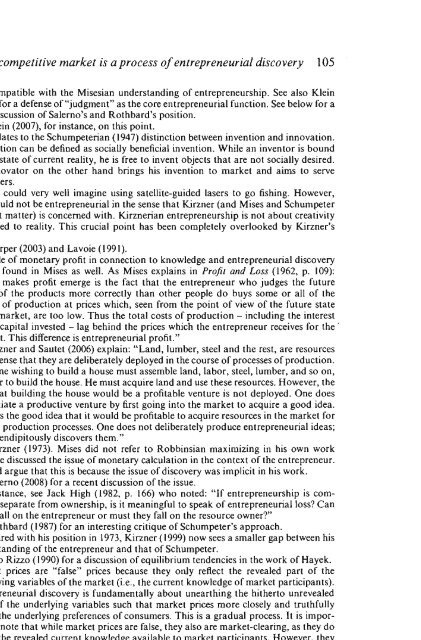Handbook on Contemporary Austrian Economics
Handbook on Contemporary Austrian Economics
Handbook on Contemporary Austrian Economics
Create successful ePaper yourself
Turn your PDF publications into a flip-book with our unique Google optimized e-Paper software.
The competitive market is a process of entrepreneurial discovery 105<br />
is incompatible with the Misesian understanding of entrepreneurship. See also Klein<br />
(2007) for a defense of "judgment" as the core entrepreneurial functi<strong>on</strong>. See below for a<br />
brief discussi<strong>on</strong> of Salerno's and Rothbard's positi<strong>on</strong>.<br />
17. See Klein (2007), for instance, <strong>on</strong> this point.<br />
18. This relates to the Schumpeterian (1947) distincti<strong>on</strong> between inventi<strong>on</strong> and innovati<strong>on</strong>.<br />
Innovati<strong>on</strong> can be defined as socially beneficial inventi<strong>on</strong>. While an inventor is bound<br />
by the state of current reality, he is free to invent objects that are not socially desired.<br />
An innovator <strong>on</strong> the other hand brings his inventi<strong>on</strong> to market and aims to serve<br />
customers.<br />
19. Crusoe could very well imagine using satellite-guided lasers to go fishing. However,<br />
this would not be entrepreneurial in the sense that Kirzner (and Mises and Schumpeter<br />
for that matter) is c<strong>on</strong>cerned with. Kirznerian entrepreneurship is not about creativity<br />
unrelated to reality. This crucial point has been completely overlooked by Kirzner's<br />
critics.<br />
20. See Harper (2003) and Lavoie (1991).<br />
21. The role of m<strong>on</strong>etary profit in c<strong>on</strong>necti<strong>on</strong> to knowledge and entrepreneurial discovery<br />
can be found in Mises as well. As Mises explains in Profit and Loss (1962, p. 109):<br />
"What makes profit emerge is the fact that the entrepreneur who judges the future<br />
prices of the products more correctly than other people do buys some or all of the<br />
factors of producti<strong>on</strong> at prices which, seen from the point of view of the future state<br />
of the market, are too low. Thus the total costs of producti<strong>on</strong> - including the interest<br />
<strong>on</strong> the capital invested - lag behind the prices which the entrepreneur receives for the '<br />
product. This difference is entrepreneurial profit."<br />
22. As Kirzner and Sautet (2006) explain: "Land, lumber, steel and the rest, are resources<br />
in the sense that they are deliberately deployed in the course of processes of producti<strong>on</strong>.<br />
Some<strong>on</strong>e wishing to build a house must assemble land, labor, steel, lumber, and so <strong>on</strong>,<br />
in order to build the house. He must acquire land and use these resources. However, the<br />
idea that building the house would be a profitable venture is not deployed. One does<br />
not initiate a productive venture by first going into the market to acquire a good idea.<br />
One has the good idea that it would be profitable to acquire resources in the market for<br />
specific producti<strong>on</strong> processes. One does not deliberately produce entrepreneurial ideas;<br />
<strong>on</strong>e serendipitously discovers them."<br />
23. See Kirzner (1973). Mises did not refer to Robbinsian maximizing in his own work<br />
when he discussed the issue of m<strong>on</strong>etary calculati<strong>on</strong> in the c<strong>on</strong>text of the entrepreneur.<br />
I would argue that this is because the issue of discovery was implicit in his work.<br />
24. See Salerno (2008) for a recent discussi<strong>on</strong> of the issue.<br />
25. For instance, see Jack High (1982, p. 166) who noted: "If entrepreneurship is completely<br />
separate from ownership, is it meaningful to speak of entrepreneurial loss Can<br />
losses fall <strong>on</strong> the entrepreneur or must they fall <strong>on</strong> the resource owner"<br />
26. See Rothbard (1987) for an interesting critique of Schumpeter's approach.<br />
27. Compared with his positi<strong>on</strong> in 1973, Kirzner (1999) now sees a smaller gap between his<br />
understanding of the entrepreneur and that of Schumpeter.<br />
28. See also Rizzo (1990) for a discussi<strong>on</strong> of equilibrium tendencies in the work of Hayek.<br />
29. Market prices are "false" prices because they <strong>on</strong>ly reflect the revealed part of the<br />
underlying variables of the market (i.e., the current knowledge of market participants).<br />
Entrepreneurial discovery is fundamentally about unearthing the hitherto unrevealed<br />
parts of the underlying variables such that market prices more closely and truthfully<br />
reflect the underlying preferences of c<strong>on</strong>sumers. This is a gradual process. It is important<br />
to note that while market prices are false, they also are market-clearing, as they do<br />
reflect the revealed current knowledge available to market participants. However, they<br />
are not equilibrium prices in the neoclassical sense, as there remains informati<strong>on</strong> that is<br />
not reflected in market prices and that could be discovered.<br />
30. Rothbard (1985, p. 284) also saw a role for equilibrati<strong>on</strong> tendencies in the market. As<br />
he put it: "It is <strong>on</strong>e thing to say, with Mises and his followers, and in c<strong>on</strong>trast to the<br />
neoclassical ec<strong>on</strong>omists, that equilibrium does not and can never exist <strong>on</strong> the market.

















